I’m excited to announce the release of a major version of Powered Cache today. It’s the greatest update since I’ve initially introduced the first version. The vast majority of the plugin has been refactored, modernized, and it’s a complete caching and optimization suite for your WordPress now.
Table of Contents
Revamped Admin UI
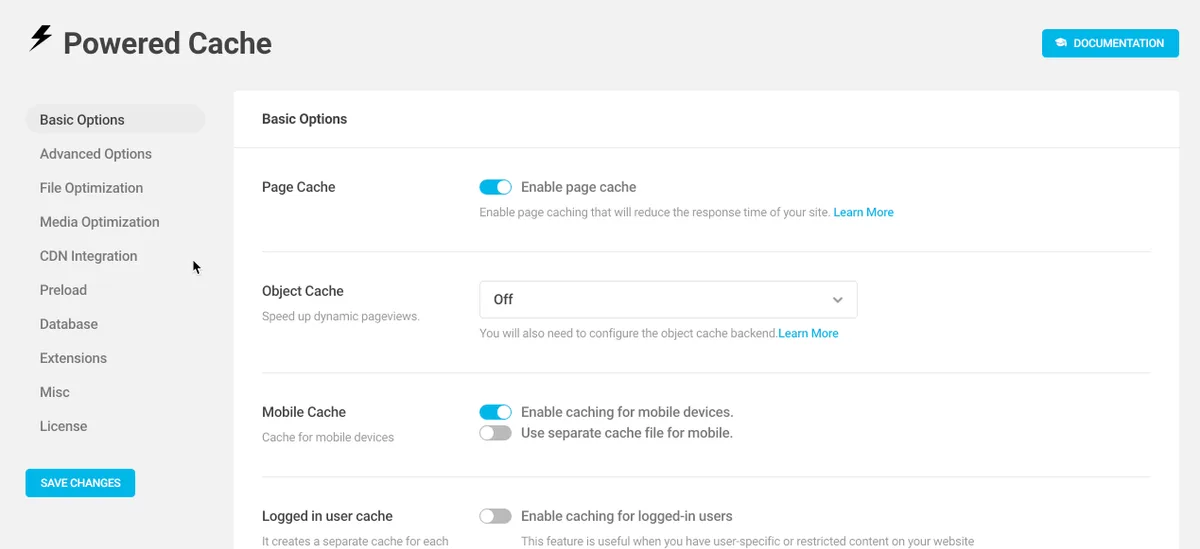
Our brand new modern UI is not just user-friendly. It also allows saving all the caching and optimization settings in a few clicks.
Disable Page Caching for Specific Posts
It’s quite straightforward to disable page cache for a particular post. You just need to check the “Don’t cache this page” option on the post editing screen when you want to exclude a specific post from the cache. It works with both classic editor and block editor.
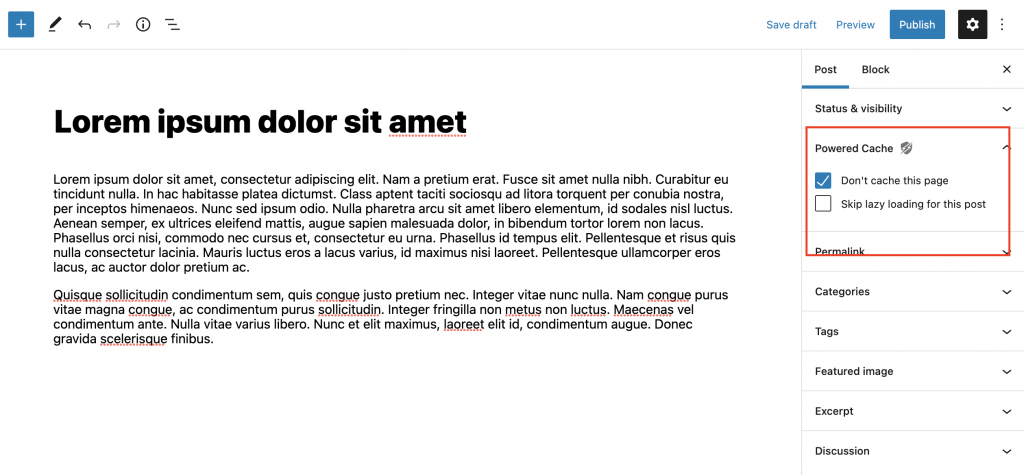
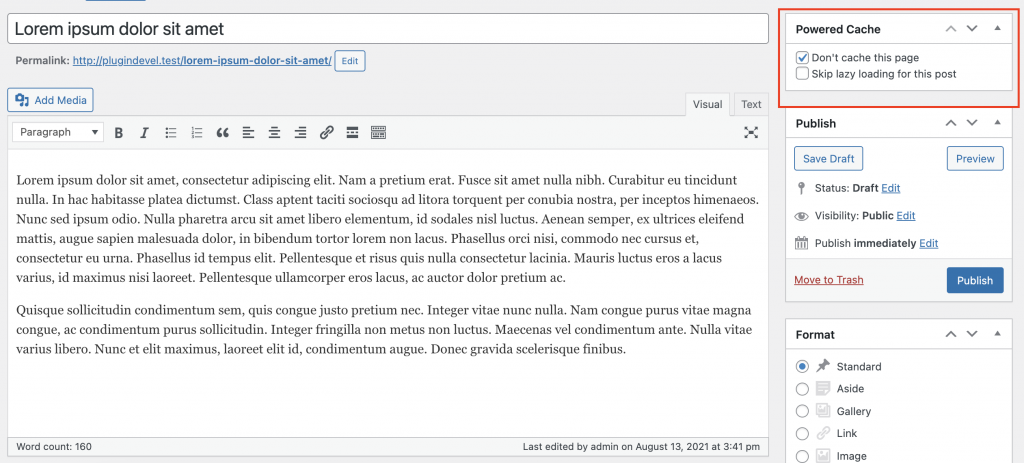
Compatible with Popular Plugins
The new version of the Powered Cache contains so many improvements to provide better compatibility with 3rd party. For example; if your website is using cookie law plugins, it will automatically detect and serve various formats of the cached results based on the user cookies. You can check the details here.
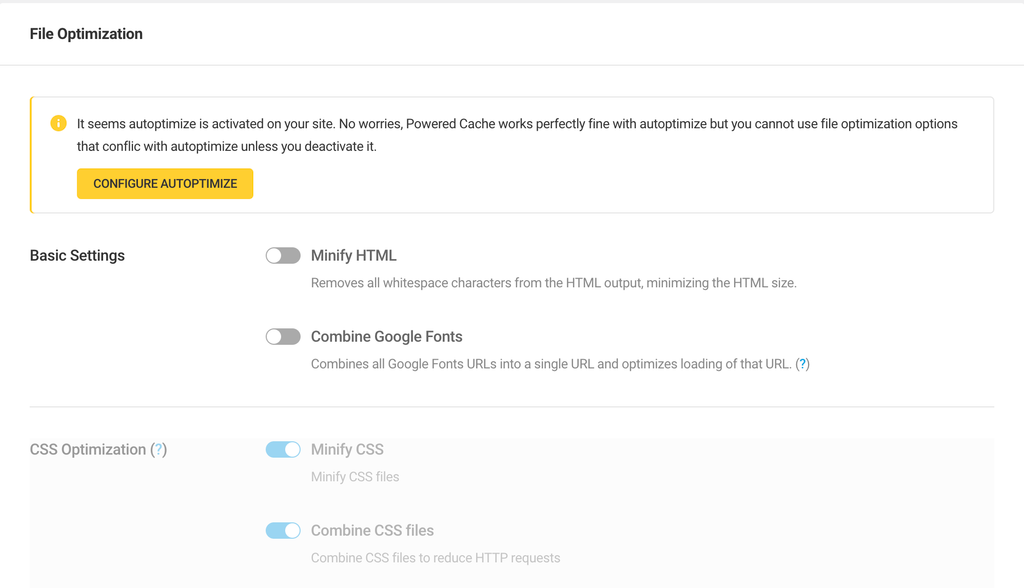
As another example; we have added compatibility with Autoptimize. If you don’t want to use our file optimizer, you can keep using autoptimize for assets minification/combination. It works like a charm.
Multisite and Domain Mapping Improvements
Powered Cache is a hassle-free caching and optimization solution for your multisite network too. You can activate it network-wide to apply caching and optimization settings to all sites.
The old version was working well with the multisite setup. However, you had to configure it for each site and need to activate per-site basis. If you want to prefer to activate it site basis, you can still do that, but it’s no longer the only way to optimize on multisite.
We didn’t forget domain mapping. It is also compatible with Mercator, which is a popular domain mapping plugin and it is also used by WP Ultimo.
Caching and Optimization for WaaS?
While WP Ultimo uses Mercator for the domain mapping; Powered Cache is a perfect way to manage caching and optimization for your WaaS (Website as a Service) platform. Perhaps I should write a detailed guide for optimizing WaaS platforms 🤔
Object Cache Updates
The object cache drop-ins have been updated.
- Redis: updated, which contains improvements and stability.
- APCu: replaced with another drop-in.
- Memcache: updated from upstream, it requires PHP 5.6.20 now.
If you are using object caching on large scale, highly recommend testing changes before updating the plugin on production.
Cache Preloading
Cache preloading was working as an extension in the previous versions. It has consolidated into the plugin as the one of main features and the preloading approach has been changed for the sake of reliability, in this release.
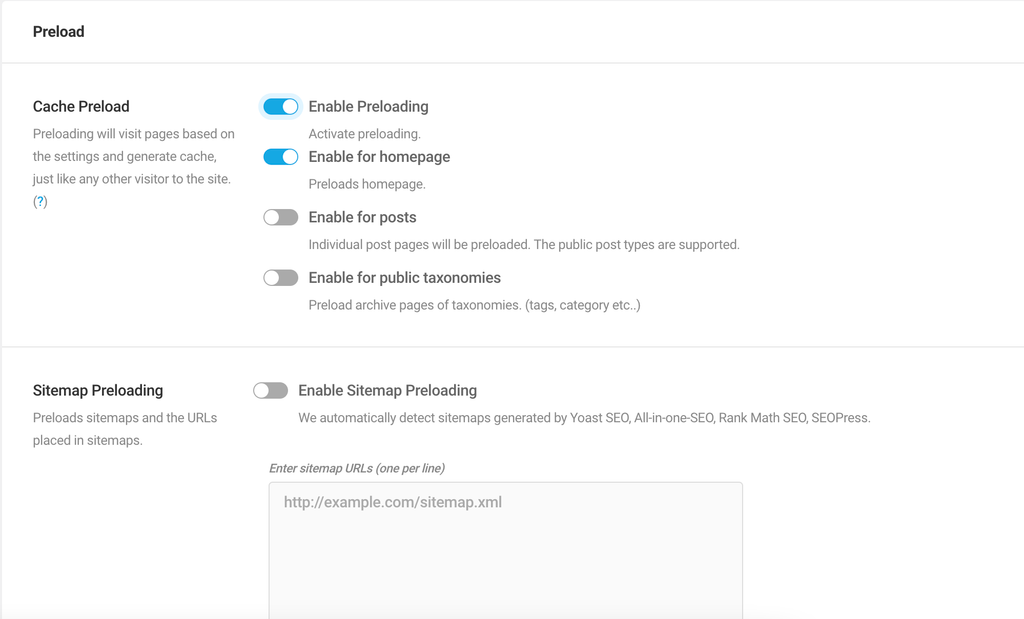
When you activated preload feature, it will keep the cache always warm. Let’s say one of the existing caches expired and needs to get cleared, it will create a new cache right after purging the expired cache.
Thanks to background processing, the functionality is completely re-architected and performs quite well on the any size of the site.
DNS Prefetch
DNS Prefetch and Preconnect are automatically set up once you enter the external URLs. This feature will help to reduce DNS resolution latency.

Sitemap Preloading
Sitemap preloading allows to preload sitemaps and the URLs found in the sitemap. It automatically detects sitemaps generated by popular SEO plugins or you can just enter the sitemap URLs. (You can find the list of automatically supported plugins on the documentation)
Sitemap preloading is only available with the premium version.
File Optimization
You can easily minify/combine JS and CSS files, just toggle the options with the new file optimization feature. It works perfectly well with the plugins/themes that properly enqueue the assets. As an addition, you can combine google fonts and load them with a single request.
The JS combination can be tricky due to dependencies. If you need to exclude one of the particular assets you can ignore them easily by entering the file path.
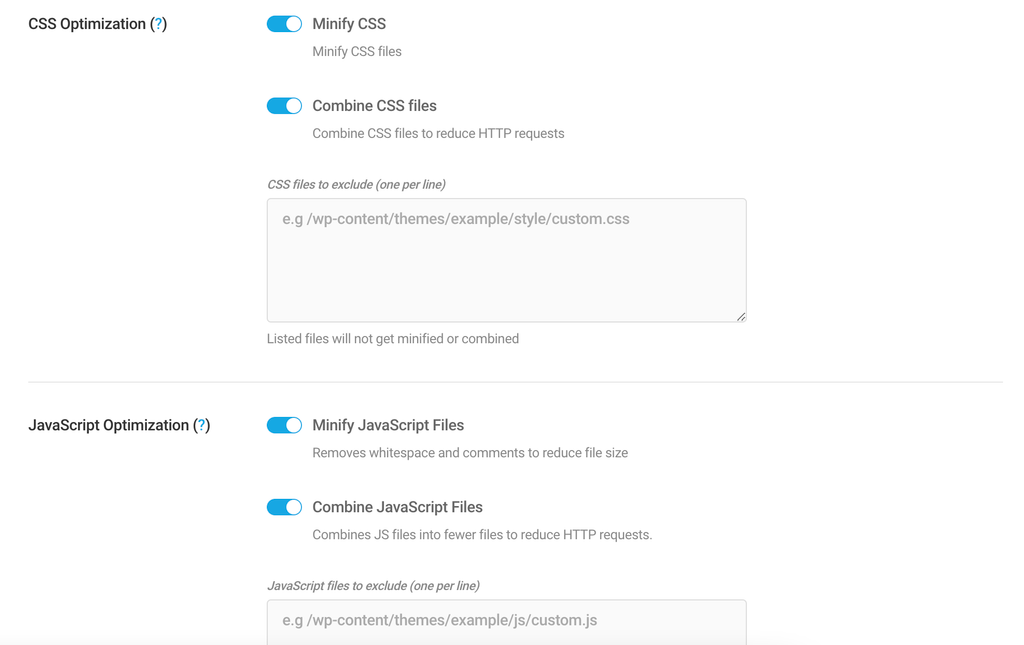
In the previous versions of the plugin, these features were provided with the Minifier extension. Based on the user feedbacks and testing under the different scenarios, the computation and memory allocation were very dependent on the complexity of the page. As result, shared hosting was not the best place to take advantage of it. In the new version, it is ported from nginx-http-concat which works much more efficiently.
File optimization is now part of the plugin. (It has been retired)
Database Optimization
It’s easy to keep unnecessary data away from your WordPress database. You don’t have to install other plugins just for cleaning up the database.
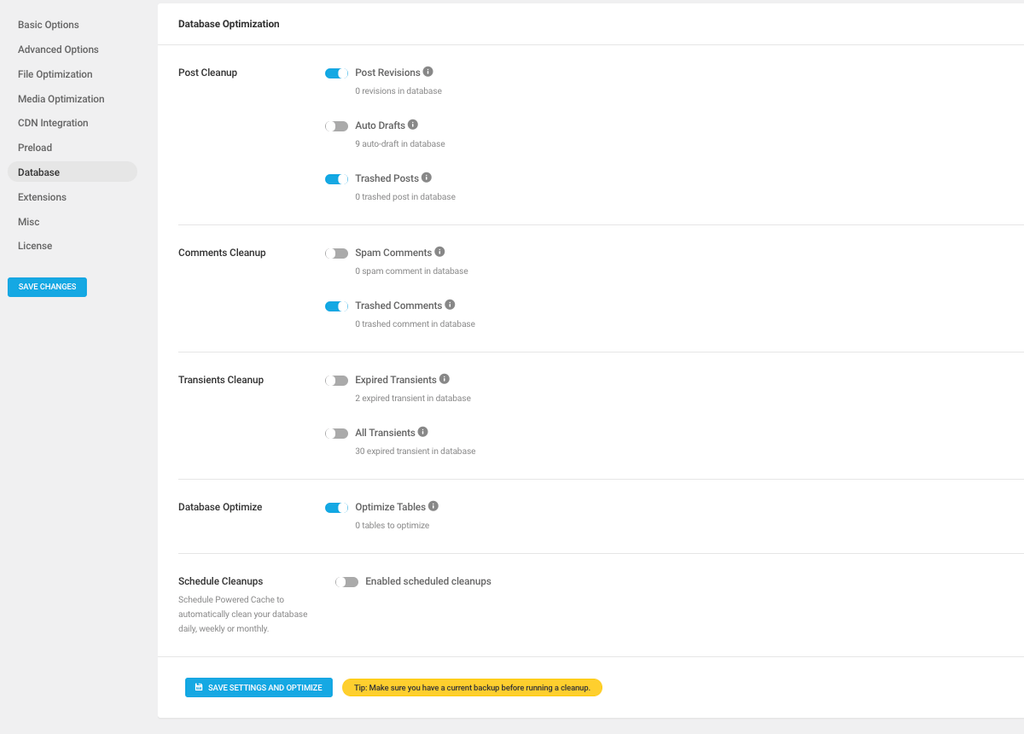
Scheduled Cleanups
Database optimization is sort of changing the oil of your car to getting a tune-up. The scheduled cleanups help your website to run smoothly all the time.
For this, Powered Cache Premium allows you to schedule the perform those optimizations periodically.
Extensions
Minifier, Lazy Load, Preloader, and Remote Cron extensions have been retired. All functionalities are consolidated into the plugin as the main feature except remote cron. Regarding remote cron, the WordPress cron functionalities work better with the PHP 7.x and PHP 7.x usage is pretty high to retire this extension.
On the other hand, most hosting providers allow you to set up server-side cron; you can still leverage it.
New Extensions
Heartbeat
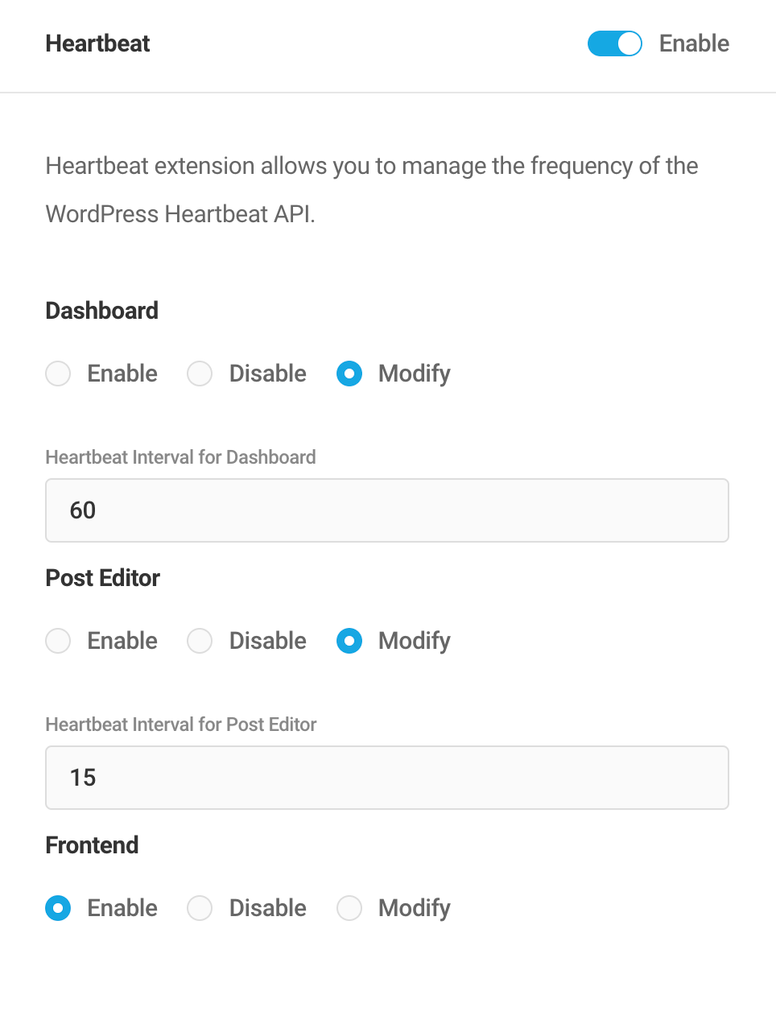
WordPress Heartbeat API is a simple server polling API built into WordPress, allowing near-real-time frontend updates. However, sometimes near-real-time updates can be problematic in resource-limited, shared hosting environments.
The heartbeat extension allows you to manage the frequency of the WordPress Heartbeat API and keep it under control if necessary.
Google and Facebook Tracking Extensions
Google and Facebook keep the JS cache lifespan of the JS files under ~2 hours for their reasons. Therefore you can see the warning about “leverage browser caching” when you run the PageSpeed tests.
In order to address these type of warnings, we have added new extensions that allow to host google and facebook scripts on your server to help satisfy pagespeed recommendations for leverage browser caching. The extension will keep the JS resourced updated by checking the lifespan of the file.
Updated Extensions
Varnish: Improvements and bug fixes.
Cloudflare: Zone ID is now a separate field. Domain selection wasn’t suitable for the accounts that hold hundreds of domains.
Breaking Changes
The entire codebase is using namespaces and requires PHP 5.6 and WordPress 5.0 as the bare minimum. Please check your website and make sure it satisfies these requirements before performing the upgrade.
If you have extended the Powered Cache functionalities through the plugin functions and hooks you will likely port the functionalities with the new hooks and functions. We have a new hook reference for the developers who want to extend Powered Cache functionalities.
Powered Cache Premium now requires Powered Cache as the dependency. Please read the upgrade guide. It requires a couple of manual steps to perform a smooth upgrade.
Under the Hood
Powered Cache 2.0 contains numerous bug fixes and improvements; here is the list of noteworthy changes:
- Improved: Accepted query strings recognition. (Eg. utm tags will be automatically ignored)
- Improved: Deletion of the expired cache.
- File export/import format: The portable configuration file is now in JSON format. The configuration pages generated for 1.x is no longer compatible with 2.x
- Composer support: If you are using composer to manage your WordPress dependencies, you can add Powered Cache as the dependency now.
- Gzip support: Gzipped cache files use proper .gz extension to leverage on
gzip_staticfeature of nginx. - SSL Cache: This option has been removed from the page cache. Powered Cache automatically configures the caching for both HTTP/HTTPS. It’s no longer necessary.
- Remove query string: Query strings no longer have an impact on the performance, thanks to modern browsers.
Extensive Documentation
This is not directly related to the plugin itself but, I’m happy to introduce new documentation sites. Most of the possible questions got answered in user guides on https://docs.poweredcache.com/ and for the developers, we have hook reference https://poweredcache.github.io/docs/
Caching and Optimization for Everyone
Powered Cache 2.0 unlocks caching and optimization features for everyone with an easy-to-use interface. Of course, Premium comes with additional functionalities but the key components are covered with the free version too.
The web performance is more complicated compared to the early 2010s, and it won’t be easier tomorrow. So we will continue to ship new updates to make it easier for you.
Thanks for trusting Powered Cache as caching and optimization of your WordPress site 🙂 We will continue to make your website lightning fast⚡️

